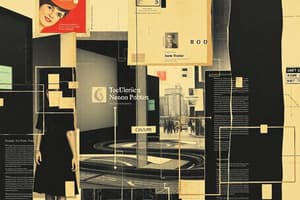Podcast
Questions and Answers
Who invented the machine known as the Stepped Reckoner?
Who invented the machine known as the Stepped Reckoner?
- Joseph-Marie Jacquard
- Thomas de Colmar
- Charles Babbage
- Gottfried Wilhelm Leibniz (correct)
What was significant about the Arithmometer?
What was significant about the Arithmometer?
- It was invented by Ada Byron.
- It was the first mass-produced calculating machine. (correct)
- It used punch cards for data processing.
- It was the first mechanical computer.
Which device is recognized as the first programmable computer?
Which device is recognized as the first programmable computer?
- Harvard Mark 1
- UNIVAC I
- Z1 (correct)
- EDVAC
Which of the following is NOT a characteristic of a computer?
Which of the following is NOT a characteristic of a computer?
What innovation did Augusta Ada Byron suggest for Babbage's Analytical Engine?
What innovation did Augusta Ada Byron suggest for Babbage's Analytical Engine?
What is the primary function of a computer's ability to manipulate information?
What is the primary function of a computer's ability to manipulate information?
Which machine was known for assisting in summarizing information and accounting?
Which machine was known for assisting in summarizing information and accounting?
In which of the following areas is the application of computers NOT commonly found?
In which of the following areas is the application of computers NOT commonly found?
What was the main function of the Difference Engine designed by Charles Babbage?
What was the main function of the Difference Engine designed by Charles Babbage?
Which computing period introduced a device used to aid in mathematical calculations before the invention of mechanical calculators?
Which computing period introduced a device used to aid in mathematical calculations before the invention of mechanical calculators?
In which year was the first commercial computer, UNIVAC I, designed?
In which year was the first commercial computer, UNIVAC I, designed?
Which of the following was the first stored-program computer?
Which of the following was the first stored-program computer?
What does the Pascaline primarily perform?
What does the Pascaline primarily perform?
Which of the following is an application of computers in banking?
Which of the following is an application of computers in banking?
What is the primary purpose of Napier's Bones?
What is the primary purpose of Napier's Bones?
Which characteristic distinguishes the slide rule from other early computing devices?
Which characteristic distinguishes the slide rule from other early computing devices?
Flashcards are hidden until you start studying
Study Notes
Definition of a Computer
- A computer is a programmable machine designed to manipulate, store, retrieve, and process data.
- Executes computations based on a pre-defined set of instructions (program).
- Key characteristics include responsiveness to specific instructions, ability to execute recorded instructions, and rapid storage and retrieval of large data volumes.
Applications of Computers in Daily Life
- Widely used across various sectors including:
- Business: Enhancing productivity and operations.
- Education: Facilitating learning through digital resources.
- Healthcare: Managing patient records and medical research.
- Retail and Trade: Streamlining inventory and sales processes.
- Government: Improving public administration and services.
- Marketing: Conducting market research and advertising campaigns.
- Science: Supporting research and data analysis.
- Publishing: Enabling digital content creation and distribution.
- Arts and Entertainment: Creating and sharing media.
- Communication: Connecting people globally.
- Banking and Finance: Automating transactions and data management.
- Transport: Enhancing logistics and vehicle navigation.
- Navigation: Assisting with GPS and mapping solutions.
- Working From Home: Enabling remote work and collaboration.
- Military: Supporting operations, simulations, and communications.
- Social and Romance: Fostering connections through social platforms.
- Booking Vacations: Streamlining travel planning and reservations.
- Security and Surveillance: Monitoring and protecting environments.
- Weather Forecasting: Analyzing meteorological data for predictions.
- Robotics: Controlling and automating mechanical systems.
Basic Computing Periods
- Tally Sticks: Ancient tools used for counting and recording information.
- Abacus: Mechanical device aiding mathematical calculations.
- Napier's Bones: Created by John Napier, allowed for simple multiplication and division.
- Slide Rule: Invented by William Oughtred, utilized for multiplication and logarithmic calculations.
- Pascaline: Developed by Blaise Pascal for addition and subtraction; costly to produce.
- Stepped Reckoner: Created by Gottfried Wilhelm Leibniz for automatic calculations.
- Jacquard Loom: Built by Joseph-Marie Jacquard, operated using punched cards for automatic weaving.
- Arithmometer: Introduced by Thomas de Colmar; the first commercially viable calculating machine capable of basic functions.
- Difference and Analytical Engines: Designed by Charles Babbage, the first mechanical calculators to tabulate polynomial functions.
- Ada Lovelace: The first computer programmer, she worked on Babbage's Analytical Engine using the binary system.
- Scheutzian Calculation Engine: Based on Babbage's work, developed by Per Georg Scheutz.
- Tabulating Machine: Invented by Herman Hollerith, used for data summarization and accounting.
- Harvard Mark 1: The first electro-mechanical computer, developed by Howard H. Aiken in 1943.
- Z1: Created by Konrad Zuse, the first programmable computer using punch tape for input and output.
- UNIVAC I: The first commercial computer, designed by Eckert and Mauchly.
- EDVAC: First stored-program computer, designed by Von Neumann in 1952, capable of holding programs and data in memory.
- The First Portable Computer: Details forthcoming on portable computing advancements.
Studying That Suits You
Use AI to generate personalized quizzes and flashcards to suit your learning preferences.




